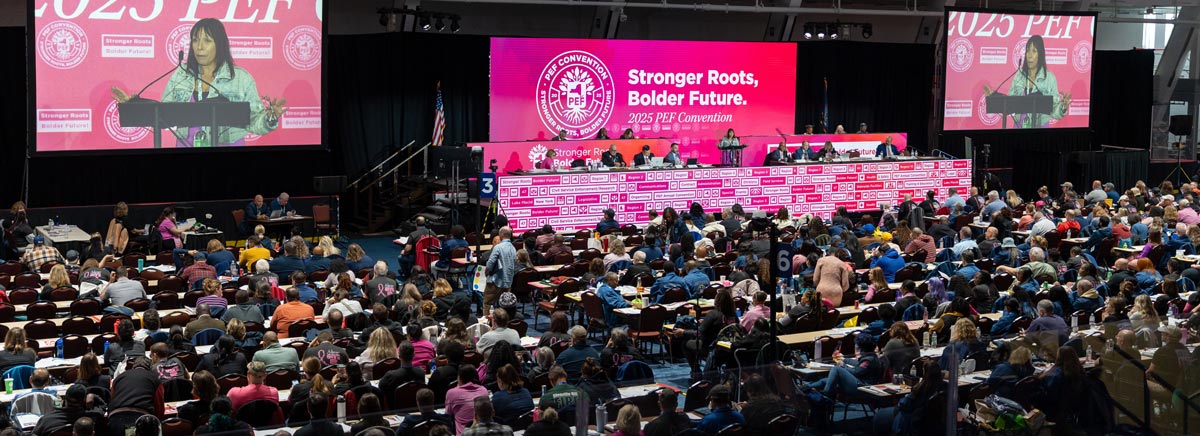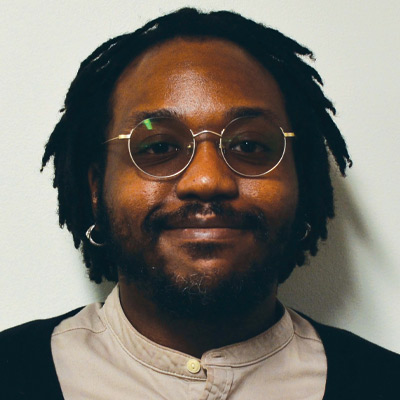
October 29, 2025 — One of the most important duties carried out annually at PEF Convention is the debate and approval of the union’s State and Federal Legislative Agendas. Developed in coordination with PEF’s Regional and Statewide Political Action Committees, the agendas delineate the issues PEF will advocate for and against in the coming year, both in Albany and in Washington.
PEF Vice President and Statewide Political Action Committee Chair Randi DiAntonio chaired the debate on Oct. 21 in Lake Placid.
“As you have heard many times from other speakers before me, but it is worth repeating—because it is important—federal funding is under siege,” she said. “And the consequences for that are already hitting home for New York State’s workforce.”
One-third of the State’s budget — which is about $93 billion — is tied to federal funding. In addition to cuts by the Trump Administration earlier in the year, which threaten many of New York’s public services and jobs, the ongoing federal government shutdown has frozen much of the funding to the state and the services they fund.
At last year’s PEF Convention, the union held honest discussions about the theoretical issues faced if the Project 2025 playbook were to be implemented. Now, said Vice President DiAntonio, those challenges are being implemented in real time.
“Across federal agencies, more than 300,000 workers have already lost their jobs,” she said. “And 1 in 14 federal employees lost their collective bargaining rights. The goal is very clear: weaken unions, shrink public service, to silence voices of working people.”
DiAntonio reminded delegates that this strategy has been deployed before against public service workers. The tactic, she said, is to devalue the work done by public servants only to then lean on nepotism, political appointees, and privatization.
“We have heard people refer to the federal workforce as bloat, fraud, waste and abuse,” she said. “People say that about us too. That we’re a burden on taxpayers. Think about how hard you work just to be characterized that way.”
DiAntonio urged delegates that despite the political machine moving against unions, the reason for unions to fight is not about politics, but principles: good contracts, collective bargaining, due process, healthcare, wages, security, and dignity in the workplace.
“Our strength lies in our union; in our values; in our strategy,” she said. “When we are united, we are powerful. When we are divided, we are paralyzed.”
With unity of purpose and by forming coalitions with other unions, PEF has delivered legislation that reforms Tier 6 of the State pension plan, regulates AI transparency, and recognizes mental healthcare coverage under workers’ compensation. Additionally, PEF played a key part on the HALT (Humane Alternatives to Long-Term Solitary Confinement) Committee, which recommended changes to the law that governs the use of solitary confinement in correctional facilities.
“A lot of people tell me, ‘I’m not political.’ If you are a government employee, you are political,” said DiAntonio, echoing a sentiment she shared with delegates at the 2018 Convention in Lake Placid. “Because we need to maintain and grow our funding so that we can keep delivering services and keep our jobs. This is an all-hands-on-deck moment.”
DiAntonio urged delegates to think of political action as part of their job. Writing letters, attending rallies, and going to meetings or visiting legislators are part of what it means to be a unionist and a public servant.
“I encourage you all to join your region’s Political Action Committee. We need activists in every legislative district—regardless of your party affiliation—because it gives members a collective voice in decisions that affect their jobs, benefits and working conditions,” she said. (Interested members need only contact their Regional Coordinator to get started.)
Following the vice president’s speech, the delegates voted to add language to both the state and federal legislative agendas to include PEF’s advocacy for “making childcare for all more affordable, accessible and higher quality through increased funding, workforce development and expanded subsidies.”
The delegates also added language to the state agenda that included support for legislation that pays full salary and medical payments for employment-related heart disease injuries for parole offices, senior parole officers, parole revocation specialists, preliminary hearing officers and administrative law judges.
Both the amended federal and state legislative agendas for 2026 were approved by the delegates. (They will be posted on the PEF website when all the final edits are made.)
COPE contributions are up
Contributions to the Committee on Political Education (COPE), a crucial component of PEF’s advocacy on the federal level, were up again this year.
“Why do we care about federal dollars?” said COPE Coordinator Don Morgenstern. “We care because more than one-third of the state’s $254 billion budget comes from federal funds. Medicaid funds services at OMH, OPWDD, DOH, OASAS, SUNY hospitals, Roswell Park. DOL is over 90% federally funded. We can’t use dues money to lobby federal politicians – this is why we have COPE.”
Morgenstern reported COPE contributions are up 10% for the third year in a row, and the number of contributors is up 7%. PEF Division 407, Metro NY DDSO, continues to be the division with the highest number of members contributing at 60%.
Members can fill out and submit an electronic COPE application on the website or the PEF app.

